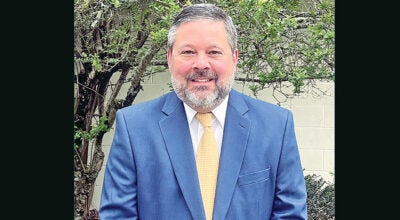Johnson talks economics, opioids, school safety
Published 10:40 am Sunday, April 1, 2018
Congressman discusses current issues in Tribune visit
U.S. Rep. Bill Johnson, R-Ohio, spent the last week touring Lawrence County and on Tuesday, he stopped by the offices of The Tribune to discuss the visit and to talk about issues affecting the nation.
Economic news
Johnson said that in his meetings this week with business and community leaders of the county, he’s hearing “a lot of optimism,” following passage of the Republican tax bill last year.
“We’ve been talking about the effect of tax reform and the positive effects – keeping more money in their pockets, businesses hiring, growing and taking on new projects.”
He said the opioid epidemic affecting Ohio is also a major topic of discussion.
“It’s something that is still talked about, and how it relates to workforce,” Johnson said. “Because we’ve got a lot of people who are setting on the sidelines that can’t pass the drug test.
He said progress has been made in efforts to combat the problem and that treatment efforts must be stepped up.
“Now that we have identified the two stimulants for the opioid epidemic – the illegal smuggling in of black tar heroin from Mexico across our borders, and the misinterpretation and oversprecscription from the medical community — we can begin to stymie off future addictions,” he said. “But we’ve got to deal with those here who are addicted today. (…) I talk to employers about giving these people a second chance, especially those who come through treatment and are clean.”
Johnson also said he has been hearing concerns regarding infrastructure.
“I can’t think of a place in the country that is in worse need or a more pressing need than here in southern Ohio,” he said. “There are water systems and sewer systems that were put in back in the 1940s and they can’t get parts to upgrade, as well as roads and bridges in need of upgrades. And broadband access — businesses won’t go into an area where they can’t get broadband access to mange their customers and suppliers.”
School safety and gun debate
Johnson was asked about the marches over the past week, where participants called for gun control efforts to be stepped up in the wake of a deadly shooting at a high school in Parkland, Florida in February.
“I’m a big second amendment guy but I’m a big school safety guy, too,” Johnson said.
“But I probably have a different view on school safety than many folks do.”
He said more needed to be done in improving physical safety of school facilities.
“After Columbine, why haven’t we made every school in the country a one point of entry with a magnetron at the door to keep people from bringing things into the school that they shouldn’t be bringing in?” he said.
Johnson said there should be a greater focus on identifying and treating those who could pose a threat.
“Most importantly, we need to identify those students who need help, who are mentally unstable, before they do something.”
He said guns are merely “the tool” used in school massacres, and cited one of the earliest in the U.S., in Bath, Michigan in 1927, in which a man used a bomb to kill 44 people.
“If mentally unstable people are determined to harm indiscriminately to innocent people, they will find a tool to do it,” he said.
Of the marches, Johnson said he thinks it’s important for the youth to avenue to express their voice.
“But I think it’s a little bit disingenuous that some are trying to exploit those people, give them the talking points and the young people who are pro second amendment are being left out of the debate,” he said.
Johnson said he met with Chesapeake school officials during his visit. The district’s high school had undergone a lockdown recently, after a threat was reported.
“I suggested to them that one of things if I were principal or superintendent of a school, I would have a student school safety council, headed up by students, where this is a conversation with students talking about this issue and where they feel safe bringing up concerns they have,” he said. “They are part of the solution. Awareness is part of the solution.”
Johnson said there is no single fix to solve the problem.
“But I don’t think taking firearms out of the hands of law abiding citizens is going to solve the problem of school violence,” he said. “I think it’s going to take a more comprehensive approach of identifying mental health issues and providing physical security to the buildings.”
Legislative proposals
Johnson wrapped up his meeting by identifying legislative proposals he will be working on when he returns to Washington.
On the issue of broadband access, he said he wants to set aside an independent inspector general for Federal Communications Commission, and he is also proposing changes in the way broadband access is mapped and hopes to better determine where underserved areas are.
“They’ve been using a census block methodology,” he said, stating this is not accurate in rural areas, where the blocks cover larger geographic areas. “If there is one broadband provider in the census block, they turn it green and say it’s served, and that’s not true — especially along the Ohio River, where you have little towns up and down.”
On the opioid front, he has reintroduced legislation focusing on over-the-counter cold medicines containing the drug dextromethorphan, an opioid. The bill would ban purchase of such medications by those under age 18.
He said he is also planning to introduce the TEACH to Combat Addiction Act, dealing with pain treatment.
“It’s designed to provide funding to institutions training health care providers on how to manage pain and the dangers of overprescribing opioids,” he said.
Tuesday’s meeting also included Tribune publisher Scott Schmeltzer and Johnson’s communications director Ben Keeler.





